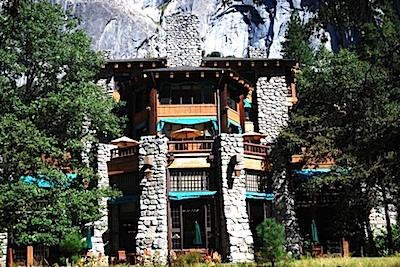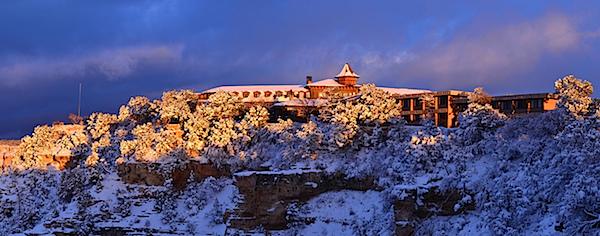
A section of the U.S. Code might allow the National Park Service to ignore trademarks attached to names such as "The Ahwahnee Hotel"/Kurt Repanshek
Efforts by concessionaires to capitalize on the names of such iconic lodges as The Ahwahnee Hotel in Yosemite National Park and the El Tovar Hotel in Grand Canyon National Park might prove to be pointless under a section of the U.S. Code.
That provision, Section 302106, specifically gives the National Park Service the right to "retain the name historically associated with the building or structure" regardless of any trademark. That language is contained within H.R.1068, which became law in mid-December.
Sec. 302106. Retention of name
Notwithstanding section 43(c) of the Act of July 5, 1946 (known as the Trademark Act of 1946) (15 U.S.C. 1125(c)), buildings and structures on or eligible for inclusion on the National Register (either individually or as part of a historic district), or designated as an individual landmark or as a contributing building in a historic district by a unit of State or local government, may retain the name historically associated with the building or structure.
National Park Service officials in Washington did not immediately respond to Traveler inquiries about Section 302106 and whether they would cite it to resolve recent developments where concessionaires have already received, or have applied for, trademarks to building names in Yosemite and Grand Canyon.
Delaware North Co., through its Yosemite subsidiary, notified the Park Service last summer that it had placed a $51 million valuation on intellectual property it held in Yosemite, including trademarks on such properties as The Ahwahnee Hotel, Curry Village, and the Wawona Hotel. Xanterra Parks & Resorts moved in similar direction in Grand Canyon in November when it applied for trademarks to most business names in use on the South Rim of the national park.
But under Section 302106 those trademarks might prove worthless, as most, if not all, the buildings the names are attached to have historic significance.
In Yosemite, there are more than 40 historic properties comprising sites, objects, buildings, and districts listed in the National Register of Historic Places. The park is also home to five National Historic Landmarks: The Ahwahnee Hotel, Le Conte Memorial Lodge, Parsons Memorial Lodge, the Rangers' Club and the Wawona Hotel & Thomas Hill Studio District.
Yosemite's historic districts include Camp Curry, and listings on the National Register of Historic Places include the High Sierra Camps at Glen Aulin, May Lake, Merced Lake, Sunrise, Tuolumne Meadows, and Vogelsang. The listings of Wilderness cabins include Buck Camp Patrol Cabin, Frog Creek Cabin, Lake Vernon Snow Survey Shelter, Sasche Springs Snow Survey Shelter, Merced Lake Ranger Station and Snow Survey Cabin, Ostrander Lake Ski Hut, and the Snow Flat Ranger Station and Snow Survey Cabin.
Dan Jensen, president of DNC Parks & Resorts at Yosemite, said Monday that he was unaware of Section 302106 and didn't know how it might affect the company's $51 million claim.
"'I've never seen that before you sent it, so I don't really know what to make of it," he said during a phone call. "Somebody does need to figure out what this means."
Speaking to the overall issue of intellectual property that DNC claims in its Yosemite operations, Mr. Jensen said there needs to be a meeting with Park Service personnel to clearly identify what intangible property DNC has accumulated over the years and assign a value to it.
"I still think that's the step that''s been missing," he said. "What's the list of assets and what are they worth?"
The issue of intellectual property at Yosemite and DNC's ownership came up as the Park Service was soliciting bids for a 15-year concessions contract that is to begin in 2016. DNC officials, hedging against the possibility that they might not win that contract, wrote the Park Service to outline their intellectual property assets and the $51 million valuation they had placed on them. If they lost the next contract, they wanted to receive that amount in compensation from the winning company.
The Park Service initially balked at including the $51 million in the contract prospectus as part of DNC's possessory interest that it would have to be compensated for. But in an amendment to the prospectus for the new contract, the agency said the winning bidder, if not DNC, could rename buildings in the park. A bit later, the Park Service amended the prospectus to place a $3.5 million valuation on DNC's intellectual property claims.
Just as DNC said a third party had appraised the value of its intellectual property at $51 million, the Park Service said it had used an outside appraiser to come up with the $3.5 million valuation. Park Service officials in Yosemite and in the concessions office of the agency's Pacific West Region did not respond to inquiries as to how they arrived at that dollar figure, or why they came up with the figure while the Solicitor's Office in Washington was researching whether DNC could seek compensation for the trademarks.
Regardless of whether Section 302106 resolves the trademark issue, DNC officials still would like to sit down with Park Service officials to sort through the value of other intangible property they hold in Yosemite.
"It's not an issue of if you're going to figure out value. At some place you need to figure out value," Mr. Jensen said. "Their $3.5 million, there is no list and there is no indication of how they got there. So something is still missing."
Last week the Park Service announced that it had received at least two bids for the contract. The winning concessionaire is expected to be named this coming summer.

Xanterra Parks & Resorts has applied for a trademark to "El Tovar."/NPS
At Grand Canyon National Park, where Xanterra Parks & Resorts has applied for trademarks for most businesses on the South Rim, buildings already listed on the National Register of Historic Places include the El Tovar Hotel, the Grand Canyon Village Historic District (which includes the El Tovar as well as the Bright Angel Lodge, the Buckey O'Neill Cabin, Lookout Studio, Hopi House, the Kolb Brothers Studio, the Grand Canyon Depot, and the Grand Canyon Railway), the Desert View Watchtower Historic District, and the Hermit's Rest concession building.
Trademark applications for "Phantom Ranch," "Bright Angel Lodge," "Kachina Lodge," "Yavapai Lodge," "Maswick Lodge," "Red Horse Cabin," "Arizona Room," "Lookout Studio," "Buckey O'Neill Cabin," "Thunderbird Lodge," "Trailer Village,""Hopi House," "Hermit's Rest," and "Desert View Watchtower," were filed by Xanterra last November.
Park Service officials in Washington have said they were monitoring the trademark application process and would raise concerns, if merited, at the appropriate public comment period.



Comments
EC, very interesting point, needless to say I have little knowledge of the issue, the contractual agreements would need study, and the issue of how this "trade mark" property right was handled from the sale of of the old Yosemite Park and Curry Company, and then 3 other previous contractors before Delaware North, well, I simply I do not know. It does appear the NPS it not sure either. An aside, I am personally acquainted with Mr. Dan Jensen, the current President of the Delaware North Company in Yosemite. He is an excellent person, dedicated to the park, a pleasure to know. I think you are right, this is a legal issue that has to be worked through.
Agreed Ron. I don't know if DNC actually has ownership or not. But if they do, that language in the code isn't going to take it away from them.
Just listen to you guys. The national parks belong to YOU--lock, stock, and barrel--and you are writing as if someone else "owns" them. Everyone doing business in the national parks does so at YOUR pleasure. Is it your pleasure to give them up? Then say so. Stop beating around the bush. The lawyers will invent whatever you like. As that old joke goes, what's two plus two? Your accountant tells you four. Your minister tells you four. Your therapist tells you four. Your doctor tells you four. Then your lawyer pulls down the shades and asks you: "What do you want it to be?!"
If I were Mr. Jensen, I would fire my lawyers and start listening to the American people. But yes, it is the age of "public relations" rather than doing what is right. Years ago, the literary critic and historian Bernard DeVoto recommended that we close the national parks if we dared not manage them properly. ("Let's Close the National Parks," Harper's Magazine, vol. 207 (October 1953): 49-52). Perhaps the time has come to revisit that idea. Let's just close them and let the lawyers fight it out. After all, we seem to forget who the owners are. Why not two plus two equals $51 million?
Sorry Alfred - Like our forefathers, I'm a rule of law guy not rule of man. What the law says is what is "right".
Not feeling that way for awhile now.
Hmmm. "What the law says is what is right." In 1765 the law said that the colonies were supposed to pay a stamp tax. In 1773 a tax on tea. You know how our "forefathers," as you describe them, decided to deal with THAT.
Count me among those who believe that laws are still made by men. In other words, they are no better than the men who make them. And since we must be "politically correct," let us not forget that imperfect women now make imperfect laws, too.
If this "imperfect" law (the trademark law) were to be heard by the U.S. Supreme Court, I remain confident the justices, in the instance of our national parks, would go back to Hutchings v. Low (1872) and rule in favor of the American people. James M. Hutchings tried to "own" Yosemite, too--and failed. The concessions clause of the Yosemite Act of June 30, 1864, was upheld. To do business in a national park, you had to be a concessionaire. You could "own" neither the land nor the property. So-called possessory interest was later meant to address the point of fair market value, but not ownership. If you lost the contract, you were entitled to recoup your investment. You were not entitled to extort the public for everything else you claimed you "owned."
When James M. Hutchings tried that, the Supreme Court was emphatic, as I do believe it would be again. In fact, I may file the suit myself.
So you are calling for revolution?
Not familiar with that case but will investigate. But if " you were entitled to recoup your investment", investment that created intangible assets would certainly seem to qualify.
I'm guessing you would be wasting your money as the suit would be thrown out for lack of standing.
Alfred - I read Hutchings v. Low. You have quite the imagination. The ruling has nothing to do with National Parks or trademarks or conssesionaires. At issue was whether a settler had derived title to land via the preemption laws prior to Congress grantng the land to the State. The court found he had not met the preemption requirements. Trademarks, concessions (in the vending sense) and National Parks are never even mentioned in the ruling - not surprisingly as they had absolutely no relevance.